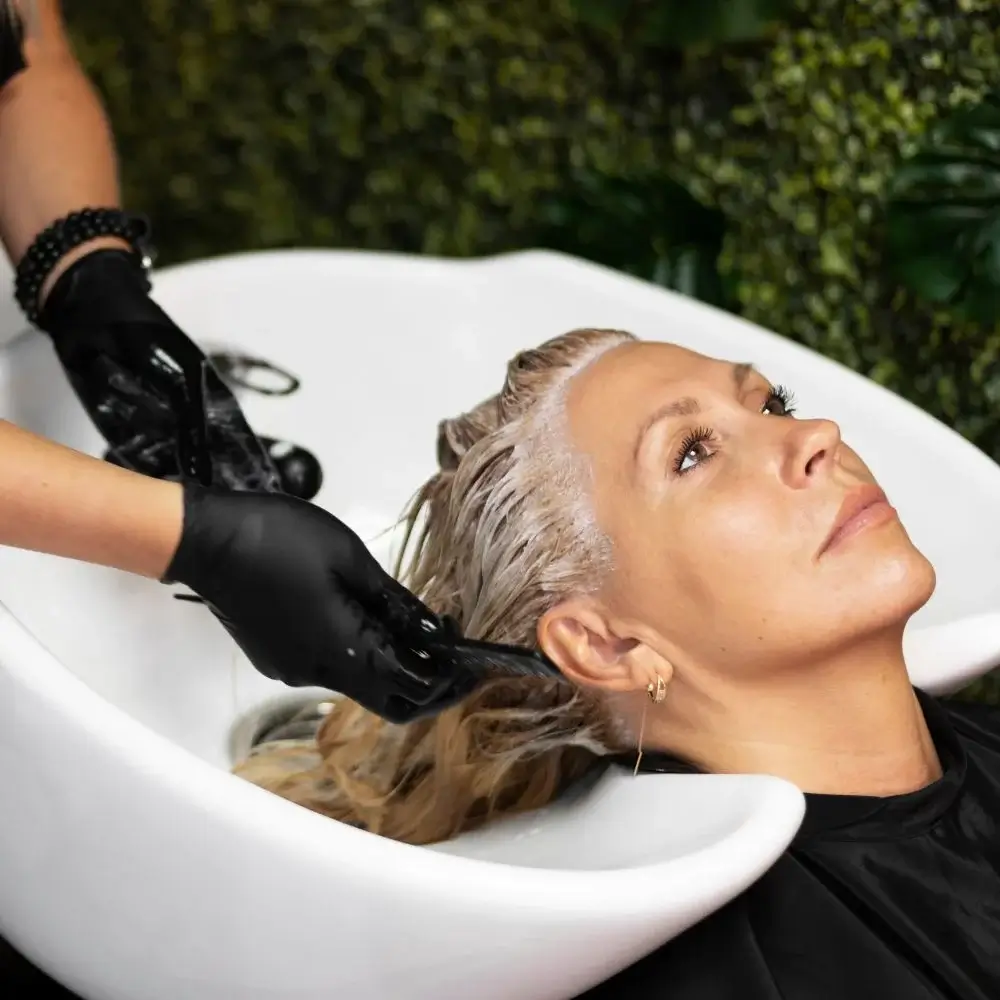As a new mom, it’s common to experience various physical changes after childbirth. One of the most unpleasant is postpartum hair loss. Hair loss is average after pregnancy and not just another hair loss issue; it’s somewhat a rite of passage of motherhood. Most new moms aren’t fully aware of how the hormones their bodies send can cause such hair loss. So, for all our fashion-loving mommies struggling with PP hair loss, here's an ultimate guide detailing the causes and timeline for postpartum hair loss.
What Causes Postpartum Hair Loss?
For every woman, the pregnancy hormone levels increase during pregnancy. These hormones lead to the growth of thicker and shinier hair, which most mothers appreciate. So, when the baby comes, the hormone levels start falling, causing sudden hair fall, commonly known as postpartum hair loss. It’s common to witness hair loss two to three months after delivery, reaching its peak around six months. The primary cause of postpartum hair loss in women is hormonal fluctuation, stress, and nutritional deficiencies.
Hormonal causes of Postpartum Hair Loss
The most significant hormonal cause of postpartum hair loss is estrogen decline, which affects every mother after childbirth, leading to hair thinning and hair loss. Throughout pregnancy, estrogen levels are at an all-time high, making the scalp’s hair follicles active and stopping the hair-shedding phase of hair growth. After delivery, estrogen hormones significantly fall, leading to hair loss.
Emotional And Physical Stress
Your body's sudden hormonal changes might cause temporary hair loss, but physical and emotional stress also contribute to hair loss. Your body might undergo massive stress during childbirth, with the body losing a significant amount of blood and other bodily fluids, leading to weakness and exhaustion. The emotional stress of adjusting to motherhood, breastfeeding, and other responsibilities could also cause hair loss.
Nutritional Deficiencies
After childbirth, your body might experience reduced nutrient absorption, leading to hair loss. This stage is usually challenging for most moms, with most failing to consume a balanced diet or failing to get an adequate supply of vitamins, proteins, and other essential nutrients responsible for hair growth. Iron deficiency, vitamin D and B12 deficiencies, and a low protein intake could cause hair loss.
How Long Does Postpartum Hair Loss Last?
Postpartum hair loss is temporary and usually stops after about six months. In most cases, hair growth will return to its normal state between six to twelve months, but it differs from one woman to another. The duration of hair loss is often a cause of concern for most mothers, but rest assured, it’s a temporary condition, and your hair shall grow back to its initial state.
Postpartum hair loss is a natural stage in every mother's life, and every woman experiences it differently. Although it can be a challenging and unpleasant experience, it isn't permanent. Like any other physical change, new moms should embrace it, knowing it is natural. Your hair will grow back, and you’ll have your pre-baby locks soon. At such times, try new hairstyles like mud braids, protective hairstyles, or hair weaves to give you a quick fix for your postpartum hair loss. Remember that a healthy diet, stress-free life, and adequate rest are essential for your hair growth and health. Remember, your hair will return to its former glory. So, don't stress it!
Dealing with postpartum hair loss can be a daunting task. But thanks to modern research, there are a plethora of shampoos that can help combat this problem. After countless hours of research, we finally found the shampoos for postpartum hair loss that could do wonders for your hair post-pregnancy. To make it easier for you, we've compiled a list of the best shampoos to help prevent hair loss and promote growth. So, if you're ready to say goodbye to hair loss and hello to luscious locks, click on the link and browse through our list of top shampoos for postpartum hair loss. Your new favorite shampoo is just a click away!
What role does nutrition play in preventing postpartum hair loss?
Nutrition serves as the cornerstone in preventing postpartum hair loss. A well-rounded diet rich in essential proteins, vitamins (particularly Biotin and D), and minerals like iron and zinc are pivotal for nurturing robust hair growth. These elements nourish hair follicles and maintain an optimal scalp environment, effectively curbing excessive hair shedding post-childbirth. Emphasize including diverse foods like lean meats, fatty fish, leafy greens, nuts, and fortified cereals in your dietary choices to profoundly bolster your hair's recovery during this transformative postpartum phase.

What is the significance of scalp health in preventing postpartum hair loss?
Scalp health is critical in preventing postpartum hair loss as it lays the foundation for robust hair growth. Comprehensive scalp care involves gentle cleansing routines, deliberately avoiding harsh chemicals, and meticulously maintaining an ideal moisture balance. By conscientiously adhering to these practices, you create an environment conducive to flourishing hair follicles, ultimately mitigating both the severity and duration of hair loss that commonly accompanies the post-childbirth period.

What are some common myths about postpartum hair loss?
The world of postpartum hair loss is riddled with many myths, each of which warrants dispelling. Contrary to prevalent misconceptions, postpartum hair loss is, by nature, a temporary condition, not a permanent one. Moreover, the erroneous belief that excess hair products can expedite recovery is not only unfounded but can actually exacerbate the situation. It is prudent, therefore, to concentrate on maintaining a balanced diet, embracing gentle hair care practices, and cultivating patience as your hair undergoes its natural journey of revitalization to regain its pre-pregnancy strength and vibrancy.

How can I prevent hair breakage and damage during postpartum hair loss?
The effective prevention of hair breakage and damage during the postpartum phase entails implementing a comprehensive protective strategy. Avoid tight hairstyles that exert undue stress on the hair shaft, markedly reduce the frequency of heat styling, and exercise restraint in vigorous brushing. Opt for the gentler alternative of a wide-tooth comb and carefully select sulfate-free, nourishing shampoos and conditioners. Consistent conditioning treatments and the meticulous application of nourishing hair masks significantly contribute to fortifying fragile hair, diminishing breakage, and fostering healthier hair growth.

How can I maintain scalp hygiene during postpartum hair loss recovery?
Maintaining impeccable scalp hygiene assumes paramount importance during postpartum hair loss recovery. Regularly cleansing your hair with a mild, sulfate-free shampoo and lukewarm water removes excess oils and impurities that can hinder hair health. Gentle scalp massages during washing invigorate blood circulation, providing a conducive environment for enhanced hair follicle health. Vigilance is required to avoid any form of aggressive scratching or the use of harsh, chemical-laden products, as these actions can exacerbate hair loss issues. Prioritizing a gentle and unwaveringly consistent hair care routine remains indispensable in nurturing your hair's journey to recovery.
Should I expect immediate results from using postpartum hair loss shampoo?
While postpartum hair loss shampoos undeniably offer benefits, it's crucial to approach your expectations with moderation. Immediate results are an improbable outcome as the hair growth process unfolds gradually. Consistency and patience are the watchwords when integrating such products into your hair care regimen. Maintain a healthy lifestyle and remain steadfast in adhering to your chosen routine. Over time, you should begin to discern a noticeable reduction in hair shedding and substantial improvements in hair thickness and texture. Your hair will gradually reclaim its natural strength and vibrancy, marking a successful journey through postpartum hair loss recovery.







